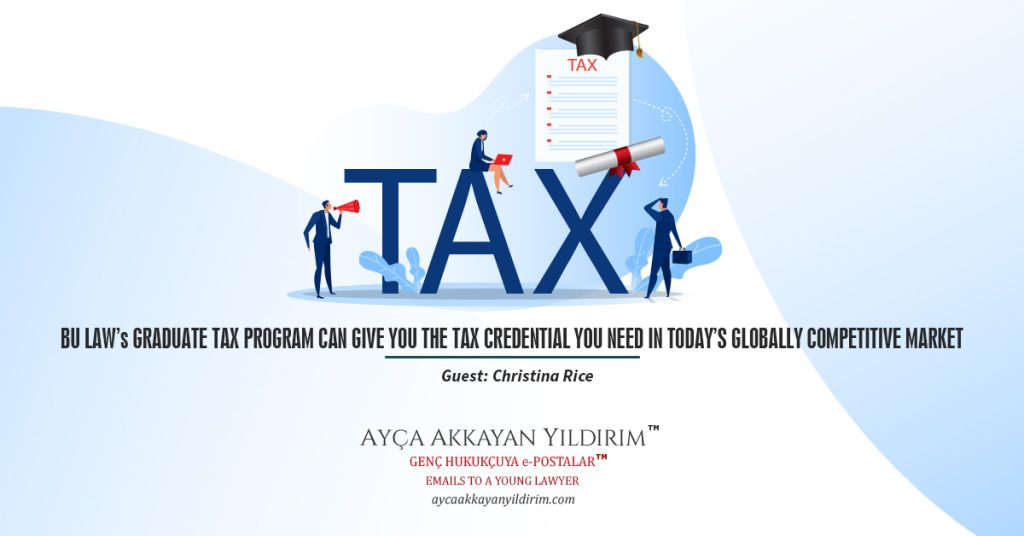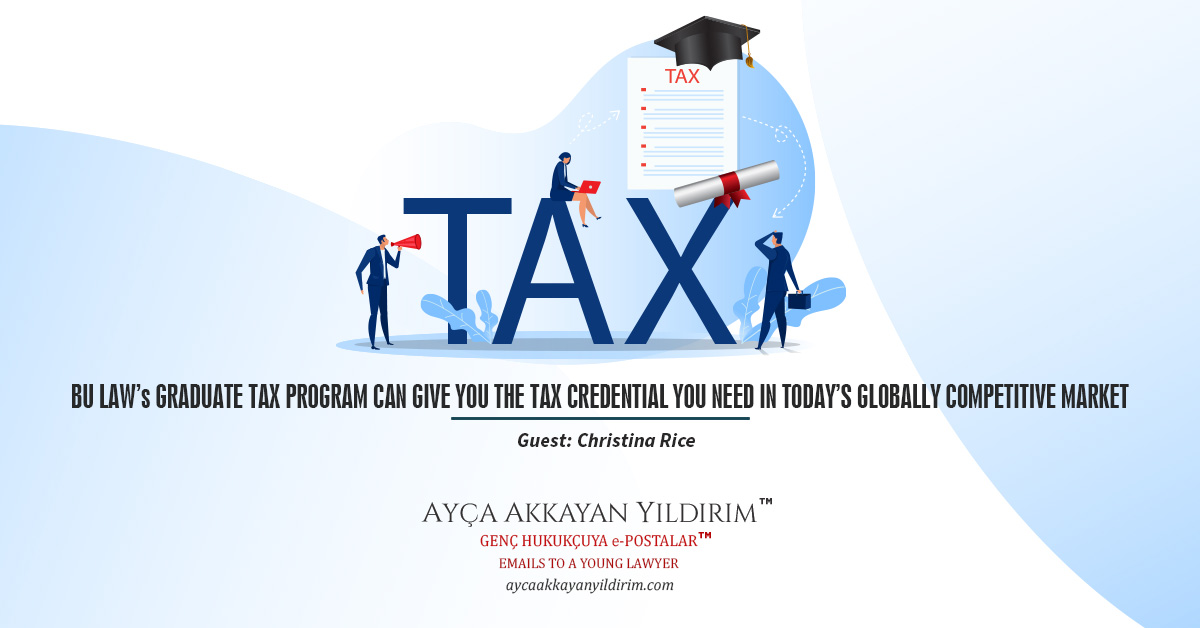Saturday, October 7, 2023


Date : October 7, 2023
To : Young Lawyers
Re : BU LAW’s GRADUATE TAX PROGRAM CAN GIVE YOU THE TAX CREDENTIAL YOU NEED IN TODAY’S GLOBALLY COMPETITIVE MARKET
INTERNATIONAL LL.M. PROGRAMS: BOSTON UNIVERSITY SCHOOL OF LAW, BOSTON, MA, USA
I sincerely thank Christina Rice, Assistant Dean of Graduate, International, and Online Programs at BU Law, for answering my questions. GHK
GHK: Director Rice, as the global financial landscape evolves, there’s an undeniable emphasis on international tax regulations. How is Boston University School of Law’s LL.M. in Taxation program tailored to equip students for these global challenges?
CR: Our program provides students with a wide variety of courses focused on international tax areas. Our foundational “Tax Aspects of International Business” provides students with a basic understanding of US tax rules that apply to both individuals and businesses and discusses the impact of tax treaties. For students who seek a deeper understanding of international taxation issues, we offer specialized courses in Inbound International Taxation, Outbound International Taxation, Transfer Pricing, Foreign Reporting and Withholding, International Estate Planning, and comparative courses in both income and consumption taxation.
GHK: The perception exists that tax law is predominantly a domestic field. How would you articulate the advantages of Boston University School of Law’s LL.M. in Taxation to international students who might be contemplating its global relevance?
CR: We are living in an increasingly globalized society, with both individuals and businesses crossing international borders more frequently. Our international students have found that a better understanding of US tax law prepares them to be advisors to multinational businesses and to individuals whose needs may include business or personal estate planning matters in multiple jurisdictions. Additionally, many countries have modeled their own tax code from that of the US, so our international students are frequently surprised to find significant similarities between US tax laws and those in their home countries.
GHK: The LL.M. in Taxation program at BU Law seems to attract not just international students but also recent JD graduates and experienced U.S. attorneys. What unique aspects of the program do you believe cater to such a broad audience?
CR: We offer a wide variety of courses that appeal to a wide variety of student backgrounds. For example, an international student may choose to focus more on international or tax policy courses, while an experienced U.S. attorney may want to focus on advanced estate planning courses. Additionally, our program offers a flexible format so students can attend in-person or online, part-time or full-time, based on their individual needs.
GHK: The LL.M. in Taxation program at BU Law boasts various concentrations and emphasis areas. Could you provide some insights into how these specializations enhance the overall LL.M. experience and its applicability in the real world?
CR: Students in our program can tailor their courses to meet their individual academic and career goals. This enhances the LL.M. experience by offering students courses they will find most interesting and relevant to their future practice. Students who choose to focus their studies in a specific area of tax can also signal to potential employers that they are uniquely qualified for areas such as international or transaction tax. Similarly, our concentration in estate planning prepares students to advise extremely complex and high-net-worth estates, which gives new attorneys a distinct advantage in the job market and allows current practitioners to take on more complex matters.
GHK: With the rise of digital learning platforms, I noticed that BU Law offers an online option for the LL.M. in Taxation program. How does the online experience compare to the traditional in-person format, and what measures are in place to ensure online students receive a comprehensive education?
CR: Many of our courses offer the option for online students to join the live classroom through Zoom. Students who chose this format have the benefit of real-time interaction with fellow students and faculty, and there is very little that is different from a typical classroom experience. Alternatively, our online students can choose to watch the recording of the live classroom session anytime during the week. Our faculty uses online discussion boards, regular assignments, and/or office hours for students attending asynchronously to ensure that online students are engaged.
GHK: Given the significant commitment both in time and finances for graduate studies, how does an LL.M. in Taxation from BU Law position its graduates in the competitive landscape of the tax profession?
CR: Our students consistently report positive employment outcomes within a year of graduation, both in the US and internationally. Most U.S. employers specializing in tax law will require or strongly prefer someone with an LL.M. in Taxation. For international employers, the LL.M. in Taxation highlights the ability of a graduate to understand extremely complex statutory and regulatory language, along with an ability to collaborate with US-trained attorneys.
GHK: Could you shed some light on BU Law’s LL.M. career trajectories in Taxation graduates? What kind of roles and opportunities typically await them upon completion?
CR: Many of our entry-level graduates will start their careers in one of the “Big Four” accounting firms, although we do have students who accept entry-level positions at law firms and government agencies each year as well. Students with prior legal work experience frequently accept positions at firms advising clients on more complex matters than they previously handled or will shift their career path to in-house counsel or solo practitioner.
GHK: The Graduate Tax Program offers a plethora of professional opportunities, from recruiting events with the “Big 4” to tax careers luncheons and more. How do these engagements contribute to a student’s holistic development and integration into the professional world?
CR: Our professional development opportunities give students a greater understanding as to the wide variety of career pathways available to those with an LL.M. in Taxation. Many of our students start our program knowing that they enjoy the study of tax law, but they are unsure what types of careers will allow them to focus on tax. These events also give students the opportunity to practice their networking skills, which can be critical to career success in the U.S. and elsewhere.
GHK: The Graduate Tax Program seems to emphasize not just academic excellence but also community engagement, with events like Boston team sporting events, pub nights, and spring receptions. How do these social events contribute to building a strong network and community for the students, especially for those who might be new to Boston?
CR: Our social events allow students to build positive relationships with their classmates in a stress-free environment. Additionally, we want our students to feel like they are at home here in Boston, even if only for one year, so we aim to give them an authentic Boston experience with regional events like apple picking in the fall and snow-tubing in the winter.
GHK: Lastly, Director Rice, for those considering applying to BU Law’s LL.M. in Taxation program, do you have any insights or recommendations to share about the application process?
CR: Don’t be afraid to ask questions! We have an incredible admissions staff that takes a lot of pride in helping students through the application process. Additionally, I really appreciate when students use the personal statement to explain why they want to pursue a Tax LL.M. and what they want in their future careers because it gives me a lot more to discuss during our admissions interviews.
